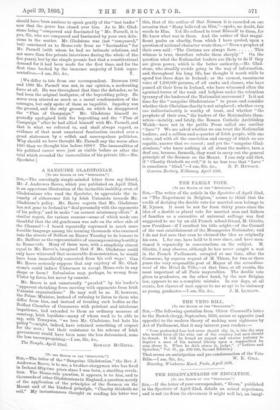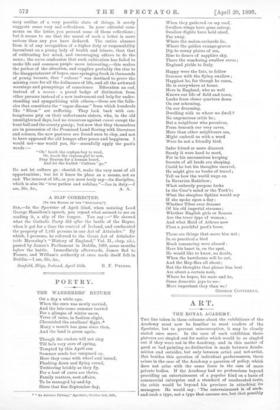THE DISADVANTAGES OF EDUCATION. [TO THE EDITOR OF TILE "SPECTATOR. "]
SIR,-If the letter of your correspondent, " Elcon," published in the Spectator of April 22nd, details an actual experience, and is not (as from its cleverness it might well be), an imagi- nary outline of a very possible state of things, it surely suggests some very sad reflections. In your editorial com- ments on the letter, you present some of these reflections ; but it seems to me that the moral of such a letter is more serious than any you have deduced. The entire absence from it of any recognition of a higher duty or responsibility incumbent on a young lady of health and leisure, than that of cultivating her mind, and encouraging others to do the same ; the naive confession that such cultivation has failed to make life and common people more interesting,—this makes the pathos of the situation, and supplies probably the clue to the disappointment of hopes, once springing fresh in thousands of young breasts, that " culture " was destined to prove the missing cure for all the dullnesses of life, and all the awkward warnings and promptings of conscience. Education an end, instead of a means : a proud badge of distinction from other persons instead of a new instrument and help for under- standing and sympathising with others,—these are the falla- cies that constitute the "vague disease" from which hundreds like " Elcon are suffering. They look back with con- temptuous pity on their unfortunate sisters, who, in the old unenlightened days, bad no resources against ennui except the bunt ball and the county gossip ; but now that they themselves are in possession of the Promised Land flowing with literature and science, the new pastures are found soon to cloy, and not to have appeased the old hunger after peace and happiness. I would not—nor would you, Sir—scornfully apply the poet's words :— "Oh! teach the orphan-boy to read,
Or, teach the orphan-girl to sew, Pray Heaven for a human heart, And let the foolish Culture' go."
Do not let culture go : cherish it, make the very most of all opportunities ; but let it know its place as a means, not an end. The interest of life, as you most truly say—its discipline, which is also its "true pathos and sublime "—lies in duty.—I



















































 Previous page
Previous page